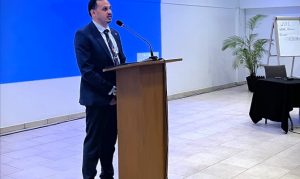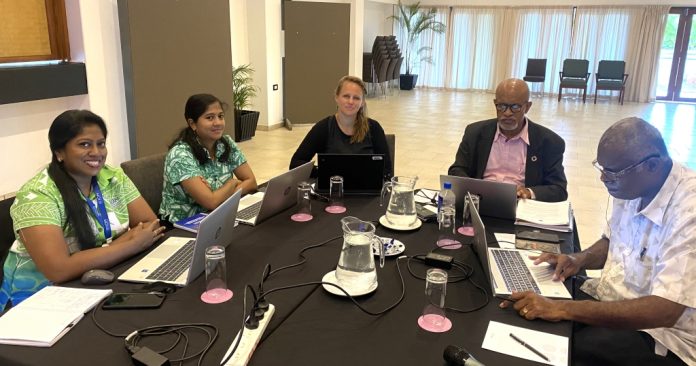Fiji has welcomed a new project designed to strengthen Pacific countries’ resilience to climate-induced loss and damage, noting that loss and damage from climate change impacts is already a painful reality for the nation.
Funded by the International Climate Initiative of the Federal Republic of Germany, the Building Our Pacific Loss and Damage Response Project (BOLD Response), one of the first loss and damage focused projects in the Pacific, was introduced to Fiji during a National Workshop on 04 April 2024.
Fiji is amongst the Pacific countries where the project will be implemented. Other countries include the Republic of Marshall Islands, Samoa, Tuvalu and Vanuatu.
Loss and Damage are the harms caused by climate change impacts that occur despite, or in the absence of, mitigation and adaptation. Loss and Damage is caused by both sudden and slow onset climate events including tropical cyclones, sea level rise, droughts, floods and ocean acidification and salinisation.
In Fiji, the impact is grim. In Vunidogola village on the island of Vanua Levu, more than 160 villagers have relocated 2km inland to avoid constant exposure to storm surges, inundation events and the impact of saltwater intrusion on agriculture and farming.
These impacts date back to as early as 2006 when floods and erosion caused by sea level rise and increased rains destroyed homes and devastated farms. The situation worsened where sea water took away land progressively. The mangroves that used to cover the whole coast have also been completely absorbed by the sea.
In another part of Fiji at Tukuraki Village, extreme rainfall caused a landslide which buried 50 percent of the village in 2012. Twelve months later, the village was hit by Category 4 Cyclone Evan, forcing villagers from their homes into temporary shelters. As if that wasn’t bad enough, in 2016 Cyclone Winston, a Category 5 Cyclone landed the final blow forcing the close-knit community to abandon the only place they had known as home.
These communities are amongst some of the worst affected in Fiji.
Speaking during the opening of the BOLD Project national consultations, Dr Sivendra Michael, Permanent Secretary of Environment and Climate Change expressed the Government of Fiji’s appreciation to the Secretariat of the Pacific Regional Environment Programme (SPREP), Climate Analytics and the International Climate Initiative of the Federal Republic of Germany for supporting Fiji in addressing one of the most pressing challenges of our time.
“The term ‘loss and damage’ may be new to some, but loss and damage is not a new experience for Fiji, with climate change already having a significant impact on communities, businesses and sectors. This is painfully evident with the flood waters yet to recede in the West,” said Dr Michael.

“As the impacts of climate change become more pronounced, and we reach limits to adaptation which cannot be overcome, addressing loss and damage is becoming increasingly relevant for our region and for Fiji.”
The national workshop in Fiji for the BOLD Response Project follow similar consultations in Samoa. At Novotel Lami, key knowledge stakeholders and experts in climate change in Fiji shared their experiences with loss and damage and looked at the current and future responses, and how the project can assist the communities already impacted.
SPREP’s Director General, Sefanaia Nawadra, acknowledged the wealth of information generously shared by stakeholder agencies about Fiji’s experience and lessons learned from the national initiatives to address loss and damage, such as the planned relocation and social protection system.
“These experiences and lessons learned from Fiji’s national responses to loss and damage will benefit other countries where the project will be implemented. The Secretariat and partner Climate Analytics would like to express its appreciation to Government of Fiji through the Ministry of Environment for allowing us to be here and engage with you all,” said Nawadra.
BOLD aims to strengthen Pacific countries’ resilience to climate-related loss and damage. A core focus will be on supporting communities in addressing non-economic losses.
SPREP’s Climate Change Adviser, Filomena Nelson, highlighted the critical importance of enabling Pacific countries to integrate loss and damage considerations in their national planning.
“This project is a very important part of our work to address the issue of loss and damage, it has the potential to safeguard important non-economic values,” she said. “We believe the capacity to better respond to loss and damage translates into saved lives, growing economies, and maintained identity for all.”
Loss and Damage was first introduced to the UN Climate Negotiations by Vanuatu in 1991, on behalf of the Alliance of Small Island States (AOSIS), proposing the creation of an insurance scheme for countries likely to be impacted by climate change such as rising sea-levels.
Since then, loss and damage has been a continuous priority for Pacific countries with a major breakthrough coming in 2022 with the establishment of the Loss and Damage Fund at COP27.
At Dubai in COP28, the historical agreement on the capitalisation of the Loss and Damage Fund was hailed as a major victory by Pacific countries.













